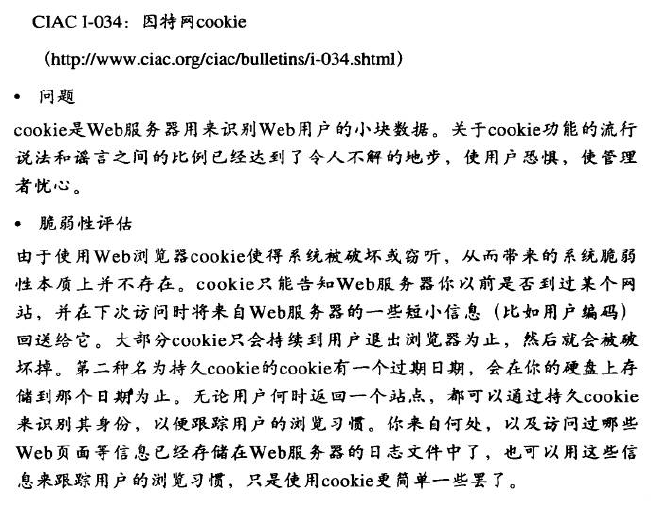w
HTTP The Definitive Guide
Cookies themselves are not believed to be a tremendous security risk, because they can be disabled
and because much of the tracking can be done through log analysis or other means. In fact, by
providing a standardized, scrutinized method for retaining personal information in remote databases
and using anonymous cookies as keys, the frequency of communication of sensitive data from client
to server can be reduced.
Still, it is good to be cautious when dealing with privacy and user tracking, because there is always
potential for abuse. The biggest misuse comes from third-party web sites using persistent cookies to
track users. This practice, combined with IP addresses and information from the Referer header, has
enabled these marketing companies to build fairly accurate user profiles and browsing patterns.
In spite of all the negative publicity, the conventional wisdom is that the session handling and
transactional convenience of cookies outweighs most risks, if you use caution about who you provide
personal information to and review sites' privacy policies.
The Computer Incident Advisory Capability (part of the U.S. Department of Energy) wrote an
assessment of the overrepresented dangers of cookies in 1998. Here's an excerpt from that report:
CIAC I-034: Internet Cookies (http://www.ciac.org/ciac/bulletins/i-034.shtml)
PROBLEM:
Cookies are short pieces of data used by web servers to help
identify web users. The
popular concepts and rumors about what a cookie can do has
reached almost mystical
proportions, frightening users and worrying their managers.
VULNERABILITY ASSESSMENT:
The vulnerability of systems to damage or snooping by using
web browser cookies is
essentially nonexistent. Cookies can only tell a web server if
you have been there
before and can pass short bits of information (such as a user
number) from the web
server back to itself the next time you visit. Most cookies
last only until you quit
your browser and then are destroyed. A second type of cookie
known as a persistent
cookie has an expiration date and is stored on your disk until
that date. A
persistent cookie can be used to track a user's browsing
habits by identifying him
whenever he returns to a site. Information about where you
come from and what web
pages you visit already exists in a web server's log files and
could also be used to
track users browsing habits, cookies just make it easier.

